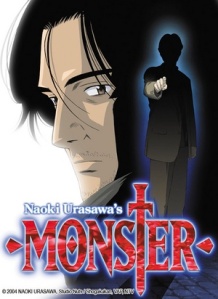- Trailer: PV Trailer
- What it’s about: The city of Ergastulum is rotten to the core, a battleground for mobsters and chemically-enhanced former soldiers known as Twilights. But even – or perhaps *especially* – in a place as corrupt as this, there’s room for some honest mercenary work, and it’s here that the “Handymen” ply their trade. The suave and laid-back Worick Arcangelo and his deaf Twilight companion Nicolas provide their services to both sides of the law, from bodyguard work and errand-running to more…hands-on cleaning-up of the city.
- Why you should watch it: Gangsta is violent, gritty, and a heck of a lot of fun. Action shows with an adult cast are few and far between in anime, and ones with a production value as high as Gangsta are even rarer. The fight scenes remind me a lot of [Attack on Titan](https://animesuggestblog.wordpress.com/2014/09/29/attack-on-titan/) with their focus on superhuman sword-wielding acrobatics and the heavy-lined and clean character art in grungy urban backdrops. The general “noir” feeling of the Ergastulum underworld is a welcome break from the anime norm, and I definitely appreciated the focus given to a character with a handicap.
- Caveats: The art is gorgeous for the first half of the show, but budget issues definitely affected the quality in the second. Normally with shows with such an explicitly Western setting I’d recommend the English dub, but I think in this case one is pretty much as good as the other, with the Japanese voice actor for Nicolas putting on a more convincing “deaf voice”.
- Similar works: Black Lagoon, Gunsmith Cats, Darker than Black
crime
Gunsmith Cats
- Trailer: Compilation of original trailers
- What it’s about: There’s a wide grey space between legal and illegal, and that’s where Rally Vincent and Minnie May Hopkins have chosen to set up shop, supplying guns and other arms to a diverse crowd of customers. Of course, it also leaves them open to blackmail – which is exactly what happens when ATF Agent Bill Collins strongarms the pair into assisting with the investigation of a gunrunning ring he’s been assigned to look into.
- Why you should watch it: It’s a classic “girls with guns” show, from before fan-service became more important than action in the genre. There are only three OVAs in the series, but they use the time wisely to flesh out the overall plot. The characters are fun and charismatic, and comfortable firing off both bullets and one-liners. Rally and May in particular play off each other fantastically, though Bill is no slouch in his scenes either. The show also manages to capture the feel of a gritty American action-drama from the 80s or 90s in a way that has you forgetting that it’s actually a Japanese cartoon. Overall, Gunsmith Cats does a really good job of blending the fight-sequences together with a certain amount of light comedy without becoming a self-parody.
- Caveats: Since the OVAs are just a single arc, there’s not a lot of time to spare for character development. The plot itself is “classic” enough to be predictable to those familiar with the archetypes.
- Similar works: Riding Bean, Black Lagoon, Gangsta.
Ghost in the Shell
- Trailer: DVD trailer
- What it’s about: The year is 2029 and the world has been fundamentally changed by the ongoing digital revolution. Cybernetics and mind uploading has become common-place, and those with the ability to hack into such systems are regarded as national assets. The story follows a group of police officers trying to track down one such hacker, a person known only as “The Puppetmaster”.
- Why you should watch it: Ghost in the Shell is one of the true classics of the entire medium. It’s a must-see if you want to understand how anime got to the way it is today. The animation stands up surprisingly well for a series that’s almost twenty years old, and the plot masterfully combines action and philosophy without a single stumble. The soundtrack, aesthetic, and plot ideas have inspired dozens if not hundreds of copycat attempts.
- Caveats: The animation does hold up well, but it’s nonetheless obvious that this is an older work, particularly with regards to sound design.
- Themes: Mind/Body duality. The nature of consciousness and the soul
- Similar works: Akira, Psycho-Pass, Bubblegum Crisis. Outside of anime, Blade Runner and Neuromancer.
Monster
- Trailer: Fan-made trailer
- What it’s about: A talented young brain surgeon named Tenma with a bright future ahead of him is forced to make a decision on who to save: the mayor of the town, with political connections to the hospital director, or a young child caught up in a grisly murder. His decision has wide-ranging implications, as people around Tenma begin dying off and he’s forced to come to terms with the consequences of his choice.
- Why you should watch it: Monster is, perhaps, the most suspenseful anime produced in the last decade. It’s a thoroughly mature psychological thriller, a cat-and-mouse game between one man seeking redemption and another well past hope of it. It’s an incredibly ambitious project, to the point where I’m surprised that it received a full adaptation. Every one of the major actors that are closest to Tenma’s quest are given their own character arcs, their own goals and motivations, and an intricate web of connections to the spider-like antagonist is steadily built up. Much attention lavished on psychology and atmosphere.
- Caveats: The show is long, at 70-something episodes, and isn’t afraid to spend its time exploring tangents and branches away from the main trunk of the plot before returning to it down the road. Even as the tensions build, it remains quite a slow burner of a show – it’s never going to be described as a “roller-coaster”.
- Themes: The nature of evil (nurture/nature) and the possibility (or impossibility) of redemption. The show is essentially an anime version of Frankenstein (the Mary Shelley novel, not the Hammer Horror movie or its derivatives), so it also follows a lot of the same themes found there.
- Similar works: As mentioned above, Frankenstein. Sticking with the Western canon, there’s a lot of similarities to the classic TV series The Fugitive, too.
Psycho-pass
And now, in no particular order, we begin with:
- Trailer: PV Trailer
- What it’s about: A near-future cyberpunk procedural drama. A computer system has been developed that can automatically and instantly determine a person’s psychological state and their likeliness to commit crimes. Its diagnoses are so accurate that society has used it to entirely replace the justice system. If your “psycho-pass” reading is too high, you’re a threat to society and should be locked up.
- Why watch it?: It’s a “dark” action-based story, and as an anime it’s probably the most easily-translatable to a Western live-action drama that I’ve ever seen. It’s an exploration of a deeply flawed utopia that expertly balances philosophical discussion with heart-pounding action. At the end of the show you’re left to decide for yourself which, if any, of the various powers were correct in their actions and motivations.
- Caveats: This is actually a pretty solid all-round show. That said, the literary references are a little pretentious, and the female protagonist is annoyingly naive in the first episode or two. She does quickly become one of the stronger characters through development, though
- Theme(s): “He who fights monsters should take care not to become one himself”. The price of peace – how much individual liberty is it worth to maintain a stable society?
- Similar works: Ghost in the Shell. Also, any of the other works by Gen Urobuchi are a good starting point – Phantom: Requiem for the Phantom is the closest from a storytelling perspective, but Madoka Magica is much better and has received an almost ridiculous level of critical acclaim. Shinsekai Yori addresses many of the same themes, but it takes a very different approach. Outside of anime, Minority Report, V for Vendetta or Blade Runner.
Psycho-pass is an important reminder that, ultimately, anime is the product of a non-Western culture. Specifically, people who rag on it for being unoriginal or retreading ground covered by classic sci-fi authors need to remember that a lot of those authors have only been translated into Japanese relatively recently, or never made a big impact. So they were never part of the ongoing literary discourse outside of a very narrow band of Western-looking sci-fi connoisseurs.
The stuff shown here is in many ways utterly new in that context; where even a moderately well-read Western viewer looks at the show and instantly says “Philip K Dick did this 50 years ago”, it’s going to be the first exposure for a lot of Japanese viewers to these ideas and motifs. And, hell, if the show convinces any of its viewers to go to a library and pick up a copy of one of the works it mentions, then I’d call the thing a success.
The second season of Psycho-Pass starts up pretty soon. I’m not expecting it to live up to quite the same standard, as the crew behind it has changed somewhat, and the vision of the new writer might not match the intentions of the earlier one. That said, I expect it’ll still be a fun ride.




